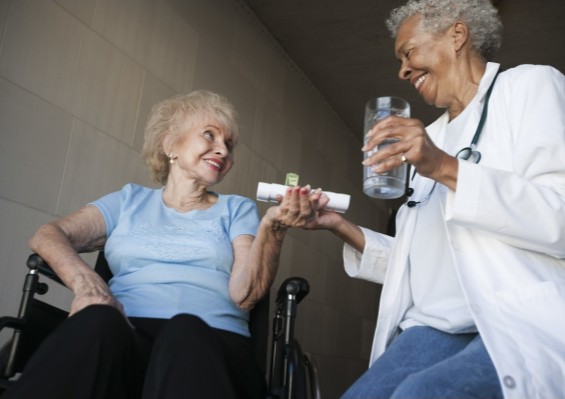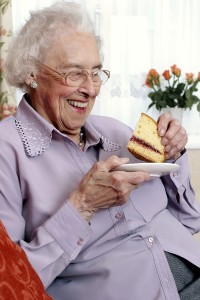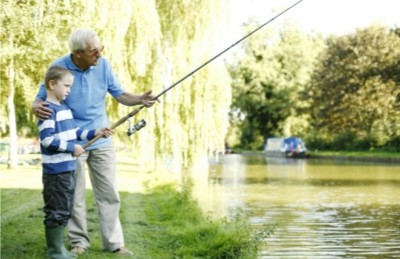How to prevent dehydration in the elderly
 Dehydration in the elderly can pose some very serious health risks. As a result, preventing dehydration in the elderly is vital to minimizing its effects. In order to prevent dehydration, you must be able to recognize the early signs and symptoms.
Dehydration in the elderly can pose some very serious health risks. As a result, preventing dehydration in the elderly is vital to minimizing its effects. In order to prevent dehydration, you must be able to recognize the early signs and symptoms.
Generally, dehydration occurs when a person loses more water than they take in. Although dehydration is usually avoidable and the symptoms can resolve quickly upon treatment, detecting signs early can be difficult. Oftentimes, symptoms do not show until the case is in moderate to severe stages, which puts seniors at an even higher risk. The key to preventing dehydration in the elderly is recognizing the signs, symptoms, and appropriate treatment options.
Why is dehydration in the elderly common?
- Suppressed thirst: The sense of thirst often becomes acute as you age. Thus, elderly may struggle to recognize when they are thirsty. Also, physical disabilities may make it harder for the elderly to access water.
- Medications: It is common for elderly to take multiple medications. These may cause increased production of sweat or may be diuretic, which can lead to dehydration if it is not monitored carefully.
- Illness: An illness can make seniors more susceptible to dehydration. Especially an illness accompanied with vomiting or other stomach ailments. These types of maladies can quickly lead to dehydration in the elderly.
- Decreased kidney functions: As our bodies age, our kidneys lose function and may become less able to conserve fluids. Individuals susceptible to failed kidneys must be especially cognizant of staying hydrated, otherwise they may quickly find themselves in a hospital.
Although dehydration in the elderly is common, the symptoms and health risks should be taken seriously and treated promptly and appropriately.
What are the signs of dehydration in the elderly?
There are a variety of signs and symptoms ranging from moderate to severe including:
- Thirst
- Dizziness/headaches
- Confusion
- Dry mouth
- Inability to sweat
- Rapid heart rate
- Constipation
- Heart failure
- Death
If you suspect an elderly person is dehydrated, there is an easy and quick test. If you gently squeeze on the skin of the forearm with your thumb and index finger, the skin should return to its original place almost immediately. If a person is dehydrated, the skin will remain in the pinched position. Once you are certain that dehydration has set in, you must assess their symptoms and immediately contact a physician. If the symptoms appear serious, you may even choose to call 911.
How is dehydration in the elderly treated?
Treatment options depend on the severity of symptoms. If the symptoms are moderate, the individual can usually be treated at home – just make sure they are drinking lots of fluids. Eating foods that are rich in potassium and sodium such as soups and broths, fruit juice, vegetables, and sports drinks like Gatorade can also be helpful in restoring the body’s electrolytes.
Severe dehydration is a medical emergency that requires hospitalization where the patient will receive replenishment of water and electrolytes through intravenous therapy or oral rehydration therapy options.
Fortunately, dehydration in the elderly can be avoided by making sure that they are adequately hydrated at all times. Consumption of 6-8 glasses of water a day is usually recommended. In addition to fluids, a healthy diet including foods with water-content and potassium are important for dehydration prevention.
At Paradise Living Centers, we make sure our residents are happy, healthy, and hydrated. Our staff is equipped with the experience and tools to ensure the best care for our residents. For more information about a variety of age-related health topics visit our blog. For any additional questions about Paradise Living Centers and the care we offer, please visit our website or call us at (480)878-4112.
 Transferring power of attorney when your parent has Alzheimer’s can be a sticky situation. Given the nature of the disease, your parent may not realize that their ability to make smart decisions is at risk because Alzheimer’s causes progressive mental deterioration in the patient. For those that are unsure about initiating this process, it is important to understand the basics first. A power of attorney is a legal document used by individuals who wish to have someone act on their behalf in making decisions, without requiring the individual’s active participation. When it becomes necessary to transfer power of attorney for your parent, you will need to explain to your parent that it is in their best interest.
Transferring power of attorney when your parent has Alzheimer’s can be a sticky situation. Given the nature of the disease, your parent may not realize that their ability to make smart decisions is at risk because Alzheimer’s causes progressive mental deterioration in the patient. For those that are unsure about initiating this process, it is important to understand the basics first. A power of attorney is a legal document used by individuals who wish to have someone act on their behalf in making decisions, without requiring the individual’s active participation. When it becomes necessary to transfer power of attorney for your parent, you will need to explain to your parent that it is in their best interest. Instead of fun and relaxing, for many, vacationing with an elderly parent can be overwhelming and stressful. The best approach for keeping things more relaxed and enjoyable is to get organized and plan ahead. In doing so, it is more likely that vacationing with your elderly parent can be a memorable experience that you can both cherish for years to come.
Instead of fun and relaxing, for many, vacationing with an elderly parent can be overwhelming and stressful. The best approach for keeping things more relaxed and enjoyable is to get organized and plan ahead. In doing so, it is more likely that vacationing with your elderly parent can be a memorable experience that you can both cherish for years to come. Recognizing the symptoms and effects of a disease like dementia can be difficult. When the symptoms begin your loved one may try to avoid a diagnosis, which results in a delay in proper treatment and can lead to very dangerous risks to your loved one’s health and safety. Unfortunately, it is not unusual for a parent to start
Recognizing the symptoms and effects of a disease like dementia can be difficult. When the symptoms begin your loved one may try to avoid a diagnosis, which results in a delay in proper treatment and can lead to very dangerous risks to your loved one’s health and safety. Unfortunately, it is not unusual for a parent to start 

 You were probably told not to sit too close to the T.V or to read in the dark. Although these are myths and won’t damage the health of the eyes, both will likely cause eyestrain. Fact or myth, it is important to take care of your eye health.
You were probably told not to sit too close to the T.V or to read in the dark. Although these are myths and won’t damage the health of the eyes, both will likely cause eyestrain. Fact or myth, it is important to take care of your eye health.

